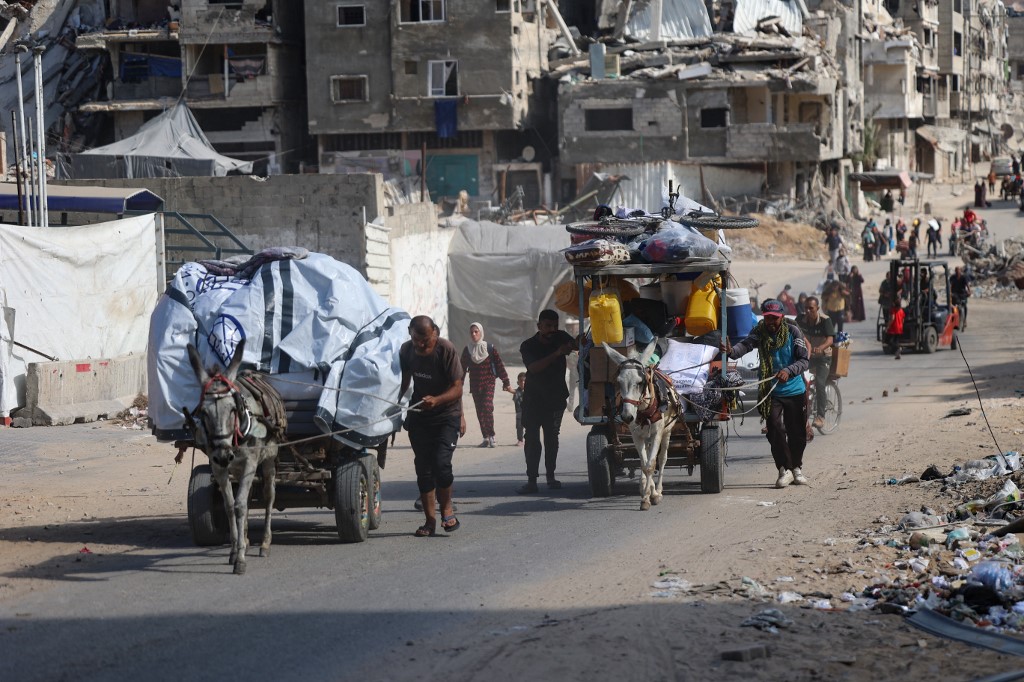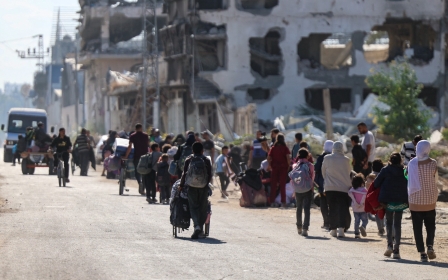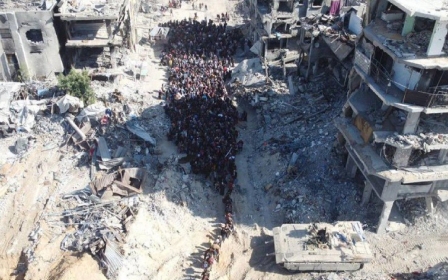‘Drop it and we’ll bomb you’: Israeli soldiers mark displaced Palestinians with glow sticks
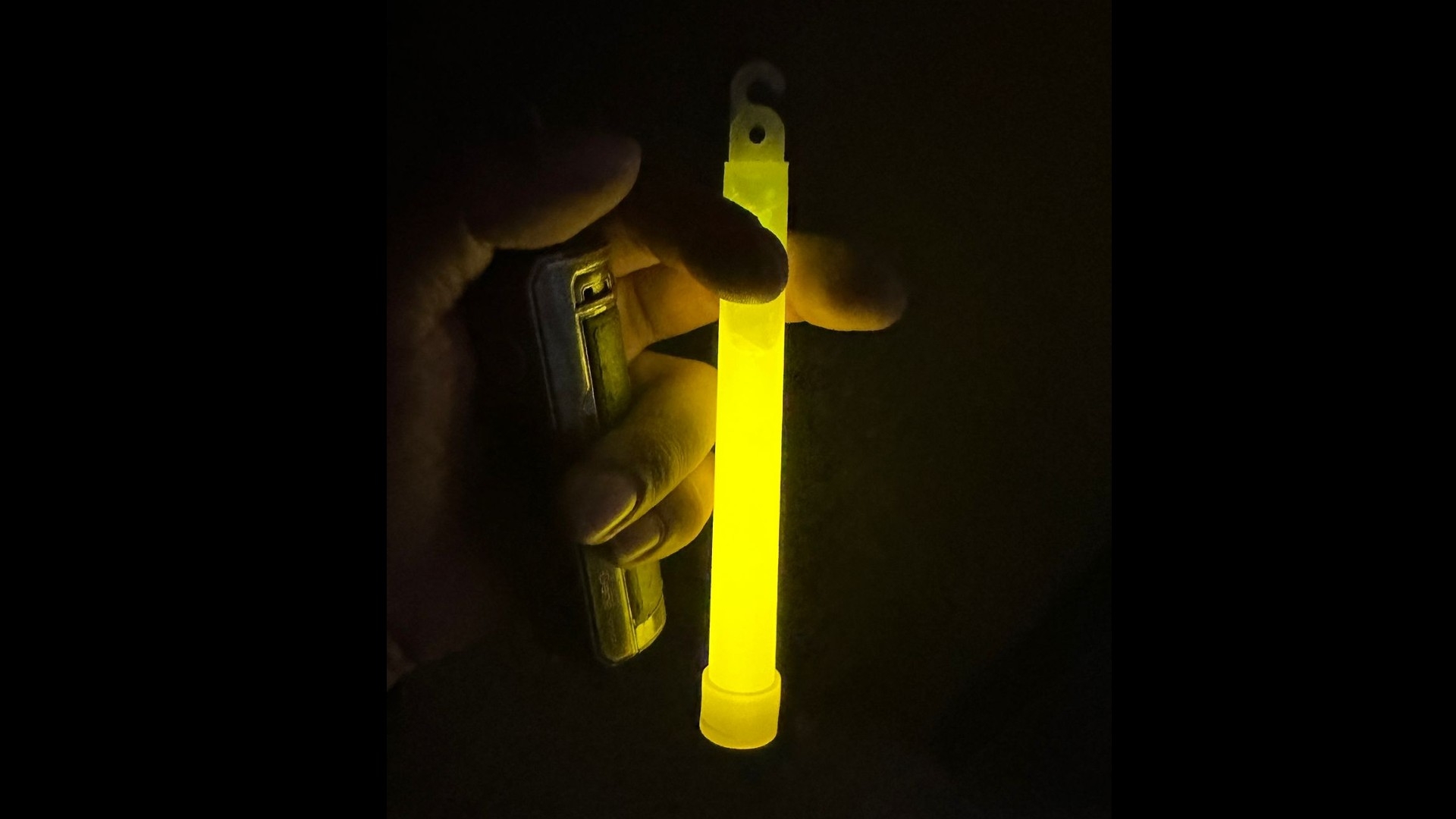
After being expelled from Gaza’s Jabalia under intense bombing, and following hours of questioning, Israeli soldiers handed Samir* a glowing stick.
He was then forced to flee south and was given a simple instruction: drop the light and you will be bombed.
It is a new practice by Israeli troops in the Gaza Strip to mark forcibly displaced Palestinians, eyewitnesses have told Middle East Eye.
The light sticks, originally intended for emergency signalling or visibility in the dark, are being used to indicate which group of Palestinians has been interrogated, cleared and is following orders for forced displacement from northern Gaza.
But legal experts warn that it leaves people without the stick vulnerable to Israeli attacks, as they could be seen as potential targets.
New MEE newsletter: Jerusalem Dispatch
Sign up to get the latest insights and analysis on Israel-Palestine, alongside Turkey Unpacked and other MEE newsletters
Samir, 42, is one of thousands of people who have been forced out of northern Gaza in recent weeks, since Israeli troops besieged the area and launched a new assault there.
Rights groups have raised fears the offensive is part of a plan to ethnically cleanse north Gaza of Palestinians and turn it into a “closed military zone”.
Forced to leave Jabalia to save his wheelchair-bound wounded friend, Samir fled the area last month with a group of women before encountering Israeli troops on the way.
'They told us: "Okay, walk and keep the light with you and don't throw it away. Drop it and we'll bomb you'''
- Samir, north Gaza resident
During the interrogation of the men, soldiers told Samir to head south and leave his friend, a request he refused to comply with.
His friend was beaten shortly after, and when Samir tried to defend him, he was hit too, he said.
One of the soldiers then reminded Samir that he was previously detained when he was at al-Awda Hospital in December, and was told to head south then.
He warned him that if he was caught a third time in northern Gaza, he would be seized.
“They threatened me with imprisonment simply for being in the north, even though they acknowledged that I had nothing to do with anything,” Samir told MEE.
After long hours of waiting, Samir was released around 11 pm with his friend and five other men and ordered to head south.
“It was dark, and the road was very rough due to the rubble everywhere,” he recalled.
“I faced great difficulties pushing my friend in the wheelchair.”
When the group reached the civil administration area, Israeli soldiers speaking via loudspeakers told them to stop and explain where they were coming from and why they were late.
“We told them that the army was keeping us,” Samir said.
“They told us: ‘Okay, walk and keep the light with you and don’t throw it away. Drop it and we’ll bomb you.’
“We kept walking until we arrived at an Unrwa school in Salah al-Din Street, where we had to sleep until the morning and then went to Gaza City.”
Glow sticks on the streets
For the past month, Israeli troops have imposed a tight siege on towns in the northern Gaza Strip.
Under the cover of heavy air strikes, they then began moving house to house and shelter to shelter, forcing people out at gunpoint.
An estimated 50,000 people have been forced out of the Jabalia refugee camp alone so far.
Those who stayed behind have had not received food or water supplies for over a month, and have no access to health care.
Living under these conditions, Muhammed Kareem Hamdan decided to leave Jabalia west and go to the neighbouring Beit Lahia town in late October.
“The road was filled with shells, bombardments and gunfire. It was something unbelievable, inhumane,” the 21-year-old told MEE.
'Even with the light, they terrified us. Tanks sped by right next to us and could have run us over'
- Muhammed Kareem Hamdan, north Gaza resident
As soon as they arrived in Beit Lahia, an Israeli quadcopter drone followed them, broadcasting recordings ordering them to move south instead.
Hamdan said after a day passed with people ignoring the message, Israel troops shelled the area and dropped smoke bombs, killing many people, including children.
With medical and civil defence crews forced to cease operations due to repeated Israeli attacks, Hadman and his family made the difficult decision to comply with the displacement orders.
“When we arrived at the Kuwait school [in Beit Lahia], the Israeli army asked the women to keep walking while the men entered the school. There were elderly women in wheelchairs left in the street who couldn’t move because the army had detained their sons in the schools, leaving them alone and unable to move,” Hamdan recalled.
“They detained us from 8am until midnight. We stayed in the school for hours without the soldiers taking any action. They just watched us all day as we stood in the sun, with no water or food.
“In the afternoon, they started taking us and putting us in front of [facial recognition] cameras, selecting who they wanted. I stood in front of the camera, and they took me in for interrogation.”
Hamdan then had to wait for hours as he saw dozens of young men stripped down to their boxers and dressed in white clothes before being taken by the soldiers to the Sheikh Zayed Towers.
“I could hear them screaming as they were being tortured there,” he said.
After midnight, the soldiers ordered Hamdan and three other men, including a disabled man in a wheelchair, to head to the southern Gaza Strip. Like Samir, they were given a glow stick.
“They gave us a yellow light. It’s a plastic piece that lights up when broken. It only lasts for about 12 hours and then goes out. This light has no on or off button; they told us to hold it and walk south,” he explained.
“This light is given to each group to signal to other [soldiers] or drones that we have been interrogated and released, so we wouldn’t be targeted.
"Yet, even with the light, they terrified us. Tanks sped by right next to us and could have run us over if we hadn’t taken caution.”
Along the route to Gaza City, Hamdan saw multiple light sticks on the ground.
“There were blue and green light sticks. I don’t know if the soldiers threw them or if they were dropped by the displaced. I’m not sure if they were carried by people who were killed. It was dark, and we couldn’t see anything.”
Pretext to ‘further harm’
Though the Israeli army told Palestinians carrying the sticks would protect them from attacks, legal experts say this conduct violates a fundamental principle of international humanitarian law (IHL), which is the distinction between combatants and civilians.
“Under IHL, attacks must be directed exclusively at combatants, and civilians must never be targeted,” Lima Bustami, a Palestinian legal consultant, told MEE.
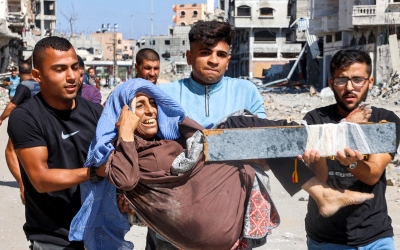
“The criteria for determining who may be lawfully attacked should be based on an individual’s participation in hostilities, not on arbitrary factors such as whether they are holding a light stick.”
Bustami added that this practice undermines the protection afforded to civilians who lack access to the glow stick, or have lost theirs, or whose sticks have malfunctioned, leaving them exposed as “direct and unlawful targets”.
It also perpetuates a cycle of fear and vulnerability among civilians, she added.
“It provides Israel with a pretext to further harm and injure more innocent people while falsely claiming the legitimacy of its actions by asserting that it has taken precautions that are, in reality, fundamentally inadequate or even misleading.”
The assault on northern Gaza has so far killed at least 1,250 Palestinians, according to local officials.
Overall, the Israeli war on Gaza has killed nearly 43,400 people and wounded 102,000 more since 7 October 2023, the majority of them children and women, according to the Palestinian health ministry.
*Name changed for safety purposes
Middle East Eye delivers independent and unrivalled coverage and analysis of the Middle East, North Africa and beyond. To learn more about republishing this content and the associated fees, please fill out this form. More about MEE can be found here.


